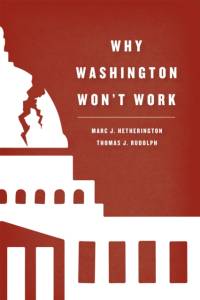Om Why Washington Won't Work
Major polls all report that "trust in government is at an all-time low" in the United States. At the same time, polarization is at an all-time high. Hetheringon and Rudolph's timely book demonstrates a direct link between polarization and the decline of political trust in America. And it's not just legislators and party leaders who are polarized, but ordinary Americans. Drawing on a cornucopia of evidence and data, the authors show that since the early 2000s polarization in the electorate has increasingly been rooted not in ideological or policy differences, but, for the first time, in extremely negative feelings toward the other party. To an unprecedented degree, Republicans and Democrats simply do not like each other. These polarized feelings are central to why trust in government has polarized which, in turn, is central to "why Washington won't work." On most issues, presidents and other party leaders can convince their own party faithful in the electorate to support their positions. In order to pass legislation, however, a public consensus is needed to push policymakers toward action. Some proportion of the out-party partisans and independents have to have enough trust in government to make an ideological sacrifice and form that consensus. As the authors persuasively explain, this is no longer occurring. Far from being a long-term and relatively stable psychological trait, political trust is highly variable and contingent. Whether or not one trusts government will vary depending on whether one's party is in control, what part of government one is referring to, and what policies or events are most salient. Political trust increases, for example, when the public identifies international issues as most important (as during the 1950s and 60s). They also find that the effects of economic performance on political trust are asymmetric: weak economies harm trust more than strong economies help it. Ultimately, Hetherington and Rudolph have to conclude that it is unlikely political trust will ever to return to 1960s levels (a high point in the US) for any length of time unless international concerns again dominate politics and, just as important, the economy becomes consistently strong.
Visa mer

